The Southern Strategy
When Henry M. Jackson ran for Congress in 1940, he could never have imagined that twenty years later he would be the Democratic nominee for President of the United States. Here he had the chance to follow in the footsteps of illustrious Democrats like Andrew Jackson (no relations), James K. Polk, Woodrow Wilson, and Franklin D. Roosevelt. Jackson's victory would continue his Party's eight-year dominance of the White House ushered in by Adlai Stevenson's election in 1952. However, in order to become the first sitting Vice President since Martin Van Buren to be elevated to the top job, he would have to overcome stiff opposition presented by two fronts. The united and energized Republican Party presented one of their most formidable tickets in decades; in a break from tradition, the G.O.P. didn't nominate dry and colorless men. The Western Conservative appeal of William F. Knowland was complemented by the Eastern Establishment credentials of Prescott Bush, giving the ticket a very nice balance. If that wasn’t bad enough for Jackson, he also had to contend with a far-right revolt within his own political party. The most diehard segregationists in the South had bolted to form a third party for the sole purpose of punishing him for his record of being pro-civil rights. Harry F. Byrd and his running mate Strom Thurmond were itching to teach him a lesson or two about trying to break free from their historic grip on the party. In the wake of the conventions, voters indicated that they were undecided about who to support. The belief that both major parties had strong viable candidates contributed to polls taken in early August 1960 forecasting the outcome in November to be the closest since the Willkie-Roosevelt race of 1940 (where the former narrowly edged out the latter in the popular and electoral vote counts). To cap off the problems he faced coming out of Los Angeles, the Vice President found turmoil within his own campaign over his choice of running mate.
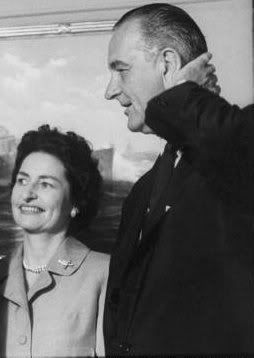
To say that Lyndon B. Johnson was controversial is an understatement. Profane and egotistical, Johnson was a man for whom there was no middle ground: you either tolerated him or you despised him. Part of it had to do with the fact that Johnson always drove people hard and did whatever it took to get his way. He was famous for his “Treatment”: he would either sweet-talk you and make you feel like you’re his best friend in the whole world or he would tear you down by literally getting in your face and letting his tall height and a few choice words do all the talking. Jackson had seen both sides of Johnson and knew firsthand how difficult he could be to handle. However, LBJ was also incredibly brilliant in understanding the machinery of Congress and possessed an uncanny sense of timing when it came to knowing what to do and when to do it. Scoop felt he needed Johnson’s skills in order to advance his agenda and was therefore willing to put up with his volcanic personality. He shrugged off concerns from members of his campaign team over the wisdom of having son-of-a-gun LBJ on the ticket, always stating that the decision was his and therefore he took complete responsibility for it. Nonetheless, people still had reservations about Johnson heading out of the convention...including some of Johnson’s own supporters.
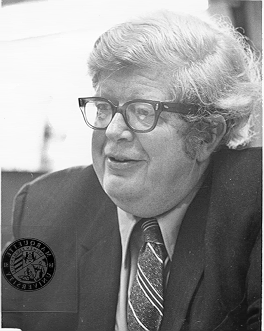
There were those who questioned whether accepting the Vice Presidential nomination would be a wise move for Johnson’s political career. One of them was a man named George Reedy. With thick white hair and a chubby chin, Reedy was someone who easily stood out in the crowd. An aide of Johnson’s since 1951, Reedy worked with fellow LBJ associates Jim Rowe and Booth Mooney for the singular purpose of advancing his boss up the political ladder. When Johnson was offered the running mate position, Reedy advised him not to take it. If Jackson lost the election, the aide was afraid that being the losing Vice Presidential candidate would tarnish any future bid for the Presidency. LBJ disagreed; he pointed out that FDR had been the losing Vice Presidential candidate in 1920 and he went on to be elected President twelve years later. Johnson of course wanted to be Vice President, seeing it as his best chance to make his ultimate dream come true. Unable to talk him out of it, Reedy then set his sights on ensuring that the Texan had a prominent role on the campaign trail. Attempts by Reedy and others to make Johnson a national figure clashed dramatically with what the Jackson people wanted to do with him. From the beginning, Jackson and his team viewed LBJ purely as a regional vote-getter. He was expected to barnstorm the South, urging voters and party leaders alike not to abandon the Democrats in favor of the Dixiecrats. In order to win the election, Jackson had to attract as many Southerners as possible and saw LBJ as the only way to accomplish that. Reedy and others were adamantly opposed to this idea; instead, they wanted Lyndon to campaign all across the country and be seen by a wide array of voters. They very much had a Johnson run in 1968 in mind and wanted to lay the foundation for his future Presidential race. By contrast, Jackson’s campaign team understandably only had 1960 in mind and was in no mood to put the political fortunes of the running mate above those of the headliner. The result was a sharp line in the sand between those who wanted Johnson to stay in the South and be productive there and those who wanted Johnson to break out of the South and reach out to everybody. This created tension within the Democratic campaign and put pressure on the Vice President to step in and put an end to the back-and-forth bickering before it did any more damage to his cause.
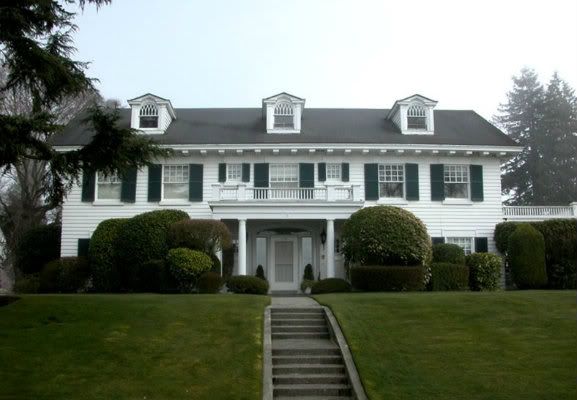
During the first week of August, Johnson, his wife Lady Bird, and a few staff members – including Reedy – flew to Everett for a strategy meeting with the head of the ticket. With reporters camped out on his gently sloping front yard, Jackson was all smiles posing with his running mate and his wife outside the two-story white frame house. Inside the house it was all business. Jackson settled the contentious debate over LBJ’s role in the campaign by stating firmly that the Texan would spend the fall entirely in the South and that would be the end of the discussion. Jackson’s campaign manager backed up the decision by expressing his belief that the ticket wasn’t required to be together at all times. In fact, it might be even better for them to embark on a divide-and-conquer strategy in which Lyndon would criss-cross his native region while Henry stuck to the Midwest and the West with limited excursions into the Northeast. Believing that the road to victory lay west of the Appalachian Mountains, Jackson wanted to concentrate heavily on keeping as many of the Midwestern and Western states in the Democratic column as possible. Having Johnson handle the South would safeguard his rear flank against the Dixiecrats' campaign. The Texas Senator agreed to the plan, in part because he wasn't comfortable rubbing elbows with high-profile liberals whom he feared would look down on him as an unrefined country boy.
“There are three places that I will not go: New York, Chicago, and California. I’m not going in there and have those liberals beat my brains out and embarrass me.”
In addition, Lady Bird would play a role in the campaign by being its’ female face. Since the Vice President was what Time magazine called the most eligible bachelor in the country, the task of attracting female voters would fall to this attractive and conservatively dressed woman. Jackson liked Lady Bird personally and thought she would make a fine substitute First Lady who would handle the ceremonial duties involved with charm and a little spunk.
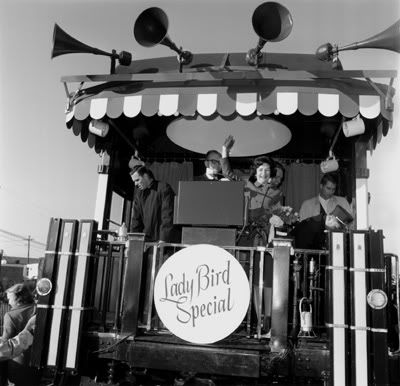
1960 marked the twentieth anniversary of the devastating German blitzkrieg military campaign which swiftly smashed through Allied lines in the Low Countries and France, resulting in the fall of Paris a couple weeks later. In recognition of that anniversary, Jackson-Johnson termed their campaign “political blitzkrieg”. Starting on favorable ground in Nashville, Tennessee, LBJ launched a whirlwind tour of the South in which he would visit every state in the region. Conferring with government officials, party leaders, and voters alike, the tireless running mate implored everyone not to rock the political boat. He warned that if the South bucked his ticket in favor of Byrd and Thurmond, there would be hell to pay on Capitol Hill. The Republican-controlled House of Representatives was already using its’ appropriation powers to steer taxpayer dollars away from the South in favor of states outside that long-dominating region. For instance, states like Connecticut and Nebraska were receiving extra defense funding...funding that in the past would have wound up in Southern coffers. A Southern rebellion would only inflame the situation by driving angry Northern Democrats into a partnership with the G.O.P. mutually dedicated to punishing them. Georgia Senator Richard Russell, the head of the Democratic ticket in 1948 and one of the more level-headed Southerners, told Johnson privately that he couldn’t support his ticket publically. That being said, Russell promised to do what he could behind the scenes to help put Georgia in the Democratic column. Although he was a segregationist by nature, the Georgian was pragmatic enough to understand that it wouldn’t help his state at all to defy the mainstream of his political party. If he had to choose between his longstanding opposition to civil rights and making sure that his state got its share of the money pie, he would choose the latter.
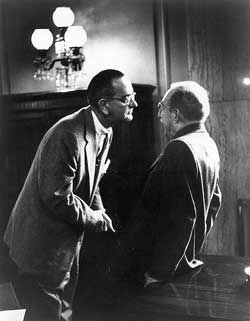
LBJ blitzkrieg his way across the South, never passing up an opportunity to use the Treatment to drive his message home to people. His whistle-stop campaign demonstrated among other things his seemingly bottomless pool of stamina. Except for a brief break in late October to deal with the death of his elderly father-in-law, Johnson rarely let up steam. Jackson communicated with him often, getting a mixed picture of the region’s attitude towards him and his ideas. The truth was that the South was heavily fractured; for instance, Johnson got a hostile reception in Virginia one day and a standing ovation in New Orleans the next. Despite the fact that he needed the South to win the election, the Vice President never set one foot in the region during the entire campaign. Furthermore, the two men on the ticket only made one joint appearance after the convention: their Election Eve rally in Los Angeles. The press, always ready to make a big deal out of anything, noticed the physical separation of Jackson and Johnson and speculated that a rift had developed between them. There wasn't, of course. The running mate was supposed to remain on his regional turf while the Democratic standard-bearer blitzkrieg his way across the rest of the country. Of course, Jackson wasn't the only one actively campaigning from sea to shining sea.





